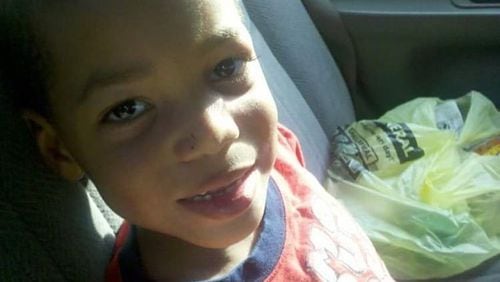Three state child protection workers were fired Tuesday for mishandling the case of 10-year-old Kentae Williams, whose adoptive father allegedly drowned him in a bathtub in DeKalb County.
State officials earlier this year investigated two complaints of mistreatment of Kentae by Leon Williams. 43, of Decatur. The second, coming a week after the first, should have been taken more seriously, said Virginia Pryor, deputy division director for child welfare for the state Division of Family and Children Services.
MORE: Cops say dad kills boy, 10, in bathtub drowning
RELATED: The short, tragic life of Laila Marie Daniel
But the workers - two DFCS supervisors and a case worker - failed to even open an investigation on that April 21 complaint. They visited the child and father, then decided to refer them for support services.
Kentae Williams, a fourth-grader at Cedar Grove Elementary School, was dead within a week.
"We should have escalated this case," Pryor told The Atlanta Journal-Constitution. "We should have had a higher level of scrutiny."
Williams attorney has said her client maintains he is innocent of all charges.
Williams is charged with allegedly burning the boy’s feet and holding him underwater while lecturing him about acting out in school on April 28. CPR efforts by the father and emergency workers failed at the family’s apartment on Glen Hollow Drive outside Decatur, a police report says.
Williams, who had been the boy’s foster father before adopting him in November, is charged with murder and child cruelty.
Warrants say Williams told police he spanked Kentae about 10 times with a belt and poured hot water on his feet in their home at Serenade Apartments.
“There were visible burns and blistering to the child’s feet,” one warrant says. “The suspect stated that the child was not listening to the suspect as he was lecturing him, and admitted to holding the child under water for 30 to 45 seconds and then repeating the same action again.”
The father and adopted son had spent time earlier in the day with neighbor Yolanda Ingram. Leon Williams became visibly upset with the boy, Ingram said.
She and Williams had been trying to correct the boy’s behavior at school, where he had called a teacher a bad name.
“As they were walking out, (Williams) said to Kentae, ‘You gonna die tonight,’ ” Ingram recalled.
The boy looked frightened. She said she did not take the threat literally, since Leon Williams had not shown any violent anger before toward his adopted son.
“Never in my life would I think a father would do that to a son,” she said.
Ingram said she’s known Williams for three years, and he had worked with the state training workers to handle behavior issues with children. Kentae, she said, loved to play video games and watch cartoons. Some published reports have said he was autistic, but she said that he was just hyperactive.
The death of the 10-year-old boy comes as DFCS strives to recover from a reputation of children dying under its watch. In recent years, under the new leadership of director Bobby Cagle, DFCS has made strides by hiring more caseworkers and implementing new policies.
Pryor, of DFCS, said the child’s death represents an “isolated incident” on the part of the child protection agency. At the same time, she noted that the caseworker had only about two years experience on the job. DFCS has a history of high employee turnover, which leads to many inexperienced workers.
“We have a young workforce,” she said.
Another DFCS supervisor was demoted, and a caseworker was disciplined, officials said.
Tom Rawlings, head of the state Office of the Child Advocate, said he sees several problems with the state’s handling of the case, and he will be doing an intensive review of what happened.
Too often, he said, DFCS workers take the word of the parent and child in such cases, without checking with other people who may know the facts. He worries that this case may reflect a problem with the culture of the entire agency, not just a few workers.
“It’s not enough to talk to the parent, and it’s not enough to talk to the child,” Rawlings said. “Children may want to stay in that parent’s home. They don’t want to throw stones at them.”
Rawlings also said he wants to review what the agency did to screen the background of Leon Williams, and what training he received to become a foster and adoptive parent.
Pryor said that Leon Williams was screened before he adopted Kentae. The first complaint against the adoptive father came in March after Kentae told school officials that his father had whipped him with a belt because he had been sleeping in class.
Agency officials opened a case and watched over the family for about a month, but closed the case when no signs of trouble emerged.
Within a week, another complaint was lodged when Kentae received some bruises and welts. In this instance, when a complaint follows so closely after another, the worker and supervisors should have started an investigation and treated the case with urgency, Pryor said.
Instead, they took the less urgent action of assigning the Williams family to support services. There were clear signs of trouble evident in the DFCS file on the family, a copy of which was obtained by The AJC through the State Open Records Law.
The worker who took the complaint on April 21 noted a concern for “impending danger” to the child, according to the 80-page file.
A supervisor points out in the file, “The child’s story of falling off the lower bunk-bed (to) carpeted floor doesn’t add up.”
This should have been a wonderful time for Kentae Williams. He had been in foster care because his mother gave birth to him at a young age and couldn’t raise him. Foster kids live in hope of finding their “forever family,” people who will raise them as their own.
“This was supposed to be the happiest part of this child’s life,” Pryor said. “But Mr. Williams made a different decision.”
She added, “That is when he murdered his child.”
About the Author




/cloudfront-us-east-1.images.arcpublishing.com/ajc/P7DYBH6TO7FEKG4SUXQQKADRXE.jpg)


